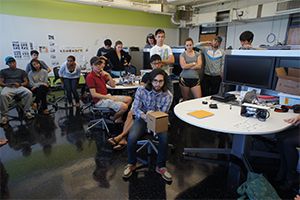This research explored the effect of intuitive versus rational thinking on creativity. Our objective was to investigate this relationship through design tasks with undergraduate industrial design students. Students performed nine separate design tasks across three conditions. Their work was scored for novelty and feasibility, and we analyzed this performance data in conjunction with self-reported mood and information processing assessments. Our results show numerous statistically significant differences. Based on our analysis, we identified a variety of simple, actionable suggestions for design educators to integrate with their teaching, as well as additional thought-provoking considerations.

Students in Georgia Tech's interdisciplinary MS in Human-Computer Interaction program do multiple group class projects, and a capstone individual project. Some projects are presented as part of other labs listed here; others are showcased in the MS-HCI Project Lab.
The two-year program spans four schools: Industrial Design; Interactive Computing; Literature, Media and Communications (Digital Media Program); and Psychology. Approximately 50 new students enroll each fall semester.


